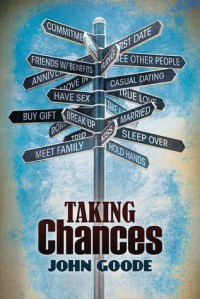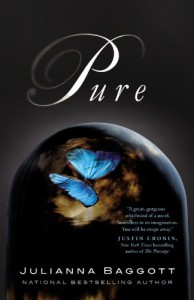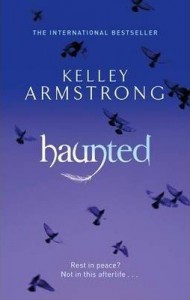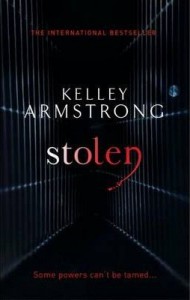Currently reading
Brave New World
Men of the Otherworld (Otherworld Stories, #I)
Tales of the Otherworld (Otherworld Stories, #2)
 rating for Jacqueline Carey's story: You, and You Alone: 4 stars
rating for Jacqueline Carey's story: You, and You Alone: 4 starsThis story is actually just a snippet, and damn, it left me heartbroken. We follow Anafiel Delaunay's memories regarding his first meeting with prince Rolande and what happened after: their romance, the betrothal with Anafiel's foster sister Edmée, her death and the lover's break-up over Rolande's new betrothed, who, as Anafiel suspects, murdered Edmée. And, of course, the tragic ending. We all now what happened and happens, know all that from the first book in the series. And the story really only contains of snippets of Anafiel's memory, but still. If you loved those characters in the past - or at least Anafiel - then this will break your heart, too. There might be a tiny bit of new information at the end, but I read the original series years ago, so I'm not sure whether that was already mentioned back then.
 rating for Jacqueline Carey's story: Martyr of the Roses: 3.5 stars
rating for Jacqueline Carey's story: Martyr of the Roses: 3.5 starsIt is a nice little story if your interested, and if you can stand a L'Envers on the throne. The country we visit here has not been eplored in the Kushiel series, which is a pity, I think. Vralia seems to be a harsh, very religious country and I would gladly go back there. This short story is hardly enough, but well - it did wet my appetite.
 I just love that title. xD
I just love that title. xD_____________________________
If you're a linguist or studying that subject, the message of this book is nothing new: language is ingrown, dissheveled, intricate, oral and mixed (using the author's words here), who would have thought?
The thing is, many people still believe that language is something static that has to be documented to be real and anything away from the standard is worth less than this standard.
Admittedly, I am sometimes called a Grammar Nazi and people are right - it does give me the creeps if people use an apostrophe to mark possession in German (which is wrong, btw, though now it is okay if it's a proper name, much to my dismay) - or even the plural (*shudders*). I believe that in such cases people are just too lazy to care about the rules, and yes, I do believe standards are useful and necessary. I like to point out that one day someone wrote me a letter and mentioned "Kwalitet" ... it took me five minutes to understand what that person was trying to tell me. She meant "Qualität", btw. "Quality".
But apart from that? Yes, I try to use the genitive instead of the dative because I think it sounds nicer. (Speaking about German grammar again!) But more often than not I don't care, just as I heretically say that something makes sense, though in German the "correct" term would be "to produce sense" ... People can get really aggressive when it comes to that one. (If you ask German purists, English is a very evil villain indeed.) And just here, with using abbreviations like "btw", I contribute to the language decay that has infected the younger generations. I shall sit in a corner and weep with shame. Maybe.
Lucky me, there are people like John McWhorter who see language as what it is: something living, something changing and therefore irregular in some way or other. And with languages, all varieties are included; I won't elaborate much further, because this is actually not meant to be an essay, just let me say this: the author shows that even small varieties have their worth, and they are usually more complicated than languages with a certain prestige, such as English. Sure, English does have some grammar I constantly keep forgetting, and the pronunciation is really tricky from time to time, but there are no genders (for example) and even though there are some irregular verbs, there are regular ones, too. Out there, languages exist in which irregularity is the rule.
I haven't made up my mind about everything he said, yet, but generally speaking: this is a funny book for those who are interested in languages, and it should be compulsory reading for conservatives and purists. It's not hard to read, if any of you worried about that. The theory is presented without many technical terms and accompanied by many, many examples and case studies. (Though I should warn you: I now have the urge to learn some more languages. Especially Indonesian, just for fun.) If you already came to the conclusion the author draws, it might still be interesting to read about the different languages out there - at least some of them.
 Liv und Mia Silber haben sich gefreut – nach Jahren des Umherziehens sollen sie nun endlich einen festen Wohnsitz erhalten. Ein hübsches Cottage in England, aus dem sie nicht wieder nach zwei Jahren ausziehen … tja, wäre da mal nicht Mr. Planänderung, in den sich ihre Mutter verliebt hat. So landen die Schwestern und ihr bayerisches Kindermädchen Lottie in London und an einer Privatschule – samt Mitschülern mit Namen à la Persephone Porter-Peregrin und des Fleisch gewordenen Rasierspaß-Kens ohne Manieren. Damit aber nicht genug: Liv hat schon immer etwas außergewöhnlich geträumt, jetzt aber nimmt das Ganze neue Dimensionen an. Sie begegnet ihrem künftigen Stiefbruder und seine Freunden (zu denen aus Rasierspaß-Ken gehört) im Traum – und die Jungs wissen davon, ja, wollen das sogar. Da steckt eindeutig ein Geheimnis dahinter, und wenn Liv etwas liebt, dann ist es das Lüften eben solcher!
Liv und Mia Silber haben sich gefreut – nach Jahren des Umherziehens sollen sie nun endlich einen festen Wohnsitz erhalten. Ein hübsches Cottage in England, aus dem sie nicht wieder nach zwei Jahren ausziehen … tja, wäre da mal nicht Mr. Planänderung, in den sich ihre Mutter verliebt hat. So landen die Schwestern und ihr bayerisches Kindermädchen Lottie in London und an einer Privatschule – samt Mitschülern mit Namen à la Persephone Porter-Peregrin und des Fleisch gewordenen Rasierspaß-Kens ohne Manieren. Damit aber nicht genug: Liv hat schon immer etwas außergewöhnlich geträumt, jetzt aber nimmt das Ganze neue Dimensionen an. Sie begegnet ihrem künftigen Stiefbruder und seine Freunden (zu denen aus Rasierspaß-Ken gehört) im Traum – und die Jungs wissen davon, ja, wollen das sogar. Da steckt eindeutig ein Geheimnis dahinter, und wenn Liv etwas liebt, dann ist es das Lüften eben solcher! Wenn ich zu einem (Jugend-)Buch von Kerstin Gier greife, dann möchte ich vor allem eines: Lachen. Klar, die Geschichte sollte wenigstens ein bisschen spannend sein, aber solange ich mich gut unterhalten fühle, sind mir die Details relativ egal.
Daher: „Silber“ ist keineswegs ein perfektes Buch. Die Charaktere glänzen nicht unbedingt mit Tiefe, und gerade zwei von ihnen gingen mir besonders auf den Senkel: Florence, die Livs künftige Stiefschwester und bildhübsch ist, deswegen aber vermutlich auch eine dumme Pute sein muss. Und Jasper Grant alias Rasierspaß-Ken, der ganz nebenbei einer der größten Vollidioten ist, die die Buchwelt je besiedelt haben. Das Gute daran ist, dass Liv durchaus sieht, was für ein Blödmann er ist. Das Schlechte daran? Sie sagt es ihm nie ins Gesicht. Also wenn der nicht irgendwann eine gepfeffert kriegt, bin ich wirklich enttäuscht. Abgesehen davon war mir Livs Schwarm relativ egal – das einzig Positive, das ich über ihn sagen kann, ist, dass er nicht so ein Ekel ist wie Gideon. Das ist doch schon mal was.
Abgesehen davon hat das Buch seine kitschigen Stellen, die mich allerdings nicht wirklich gestört haben – Kitsch gehört bei Kerstin Gier irgendwie dazu und Liv merkt selber, was für einen Stuss sie da manchmal quasselt. Und da es nie zu viel des Guten wird … was soll’s?
Wovon es mehr hätte geben können, ist Spannung. Die macht sich gerade am Anfang ein wenig rar (was nicht heißt, dass es langweilig wäre), und daran ändern auch die eingestreuten Blogeinträge à la Gossip Girl nichts. Die hätte man meinetwegen auch weglassen kann, es ist nämlich viel interessanter, was hinter der Traumsache steckt, statt wer die Tratschobertante der Schule ist. So lässt sich der rote Faden nicht wirklich erkennen – was man aus den anderen Büchern aber nicht anders kennt. Die Eskalation kam dann fast ein bisschen plötzlich, aber das hat mich wirklich nur minimal gestört.
Denn: Neben all dem gab es nun mal viel zu lachen, und das ist es ja, was ich wollte. Zwar hat mir die Rücksichtslosigkeit der Eltern (und die ungewollte Grausamkeit der Mutter) beinahe körperliche Schmerzen bereitet, aber mit vielen anderen der Charaktere kann man jede Menge Spaß haben. Liv ist eine coole Protagonistin mit netten Sprüchen, auch wenn sie sie nicht immer dann loslässt, wenn ich es mir wünsche. Trotzdem: Mit ihr ein Abenteuer zu erleben, macht Spaß, und selbst wenn sie mal kurz ins Kitschland reist, gibt es immer noch ihre kleine Schwester Mia. Die ist selbsternannte Detektivin und hält nicht viel von diesem Liebeskram; wenn sie mich liebreizend lächelnd mit unverschämten Fragen bombardieren würde, würde sie mir vermutlich auf die Nerven gehen, aber so als Zuschauer kann einem eigentlich kein besserer Charakter begegnen. Nicht zu vergessen Lottie und ganz besonders Grayson, der sehr schnell Großer-Bruder-Qualitäten zeigt, was gerade mich – als älteres Geschwisterkind mit ewig unerfülltem Wunsch nach einem großen Bruder – sofort ins Schwärmen gebracht hat. Gerade auf ihn und Mia freue ich mich im nächsten Band – manchmal gibt es eben doch nichts Besseres als Geschwister.
Und wie gesagt, am Ende wird es sogar spannend, mal abgesehen davon, dass die ganze Traumsache an sich einfach wahnsinnig cool ist. Mit der Auflösung hatte ich so auch nicht gerechnet, auch wenn „Auflösung“ vielleicht ein zu großes Wort ist. Das Geheimnis ist fast sofort offensichtlich, aber was steckt noch dahinter? Warum kann Liv in den Träumen wandeln, wie gelingt es den anderen? Und warum nur sie? Hat das wirklich mit einem Dämon zu tun? Oder was? Und wie? Und hä?? Es bleiben da einige essentielle Dinge ungeklärt, aber auch das ist man von der Edelstein-Trilogie gewöhnt. Spätestens im letzten Band wird sich wohl alles aufklären, aber bis dahin … einfach Spaß haben und gut ist.
Allzu viel sollte man nicht erwarten – die Spannung lässt sich recht spät blicken, der rote Faden nicht wirklich und besonders originell mögen die Figuren auch nicht sein. Aber wer nach locker-flockiger Unterhaltung sucht, ist bei Kerstin Gier mal wieder genau richtig. „Silber“ ist nicht nur schnell gelesen, sondern macht auch richtig Spaß, vielen sympathischen Charakteren sei Dank. Außerdem sorgen viele ungeklärte Fragen dafür, dass der nächste Band eigentlich nicht schnell genug erscheinen kann, aber da wird man sich wohl trotzdem noch etwas gedulden müssen.
 Die deutsche Rezension findet ihr hier.
Die deutsche Rezension findet ihr hier.___________________________
High School: a time full of possibilities or the worst nightmare you can imagine? For 14-year-old Rose it’s the latter; a few months ago her father died and the teachers still have those sympathetic looks for her. Her best friend Tracy, though, has only other things left on her mind: cheerleading, clothes and the big question about her first time with her boyfriend, who Rose really isn’t on friendly terms with. Add to that a mentally absent mother, a fleeing brother and Jamie, or more accurately: the guy Rose has had a crush on for forever, though she has no idea what is going on between them … if anything at all. It’s not hard to imagine why Rose is so angry – she is heading for trouble and the only question left is who will have to bear the brunt of it … and who will be damaged the most.
It didn’t take long for me to realize that I really like Rose Zarelli. One of the problems I often have with contemporary books is that I can’t identify with the characters – first love, the impression you make on others and you-know-what … yeah, that were issues for me, too, but never big ones. Parties and all that stuff, I never cared about; and here comes Rose Zarelli not caring the least bit about it as well. In this case, I’m the instalove victim and I don’t mind it at all.
Besides that, she isn’t as angry as I imagined. The anger still is an important part of the story; her father is dead, after all, and that for very tragic reasons. Of course she’s angry – I wanted to shake her mother, kick her brother’s ass and give Tracy a piece of my mind, all while I could see their reasons for acting that way, as well. (Mostly; Tracy’s another matter.) Rose is not the only one who is angry and she’s not the only one who is entitled to be it. When she learns how to deal with that emotion, and when her perceptions and actions change as well, this book becomes very moving. Just a hint: tissues might be a good idea.
Still, this is only one aspect of the story. As tragic as Rose’s situation is, she’s in puberty, in her first High School year and life continues whether she likes that or not. Well, and there are so many things to consider and decide! Some afternoon activity would be nice, but what if that reminds you too much of your father? Plus, Rose might not be ready for sex yet, but there is no way avoiding that topic – in that context I really liked the scene at the gynaecologist, even though it raised some questions that hopefully will be answered in the next book. But this visit is awkward for Rose, even unpleasant, just as your first visit there often is. And why shouldn’t that be said for once?
And yes, it’s probably not very surprising ... Rose has a crush. On Jamie Forta and I still don’t know how old that guy actually is. This creates one of the main conflicts that drive the story and leads to the second book. Jamie’s not only the bad boy (how bad he really is remains to be seen), but he’s also in a relationship with Regina, a cheerleader hellcat par excellence. (Before you’re disappointed with the coined cheerleader stereotype: not all of them are like Regina, and I think the book makes that clear.) All of that wouldn’t be much of a problem if Jamie made his attentions clear and Regina wasn’t so crazy. However, as it is – and as a consequence – this book also deals with harassment, just as it does with alcohol abuse and other things that look cool and great at first, but aren’t if you take a closer look.
All of that sounds awfully serious? Don’t worry, you’ll be able to laugh a little as well; Rose speaks sarcasm after all, and not all characters are annoying or disappointing or confusing or anything like that. Just take Angelo, who gets very small when he makes a girl cry and generally is a nice guy you wouldn’t mind meeting more than once.
Furthermore, the beginning of each chapter does some cheering up with presenting unusual words that describe a situation or a person in Rose’s life – she has a knack for those words, you know? Even though they are again a reminder of her father, they’re often worth a smile and definitely useful when it comes to your own vocabulary.
With “Confessions of an Angry Girl” Louise Rozett presents a moving and funny story about a 14-year-old, very angry girl with a particular liking of strange words. Sounds entertaining? It is, even though it isn’t a perfect book. With Rose, we finally get a character those of us who don’t care about parties and all that can identify with; but everybody else should be able to like her as well. She is very likable after all. This book is a trip back to an age many of us might not want to think about too often, but you know what? It was fun and I can’t wait to see what happens next in Rose’s life.
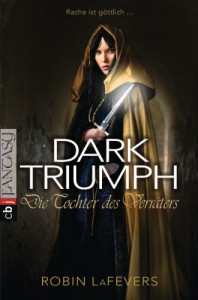 Die deutsche Rezension findet ihr hier.
Die deutsche Rezension findet ihr hier.3.5
___________________________
Brittany, 1489: Sybella has been sent to Count d’Albret for one reason: she is his daughter and can spy on him without being instantly caught. Doing that still isn’t easy. On the one hand, she has to risk so much that it could betray her and there is no doubt her father would kill Sybella the second he found out the true purpose for her being with him. On the other hand, her past, her childhood and life together with this man are slowly ruining her. Too many horrible things have happened, and more are to come. Then she is ordered to free a captive who is one of the Duchess’s supporters and to send him back to her – he might not only be his regent’s rescue, but also Sybella’s.
I had hoped for “Dark Triumph” to be better than “Grave Mercy”, but in the end it was neither better nor worse (for me); which isn’t a bad thing, seeing that I did like the first book after all.
Back then I had hoped for a very short moment that de Lornay would be the second book’s love interest, but who didn’t completely forget what happened in book one knows that this isn’t likely to happen. So, yes, the mysterious knight here is Beast. Which was obvious from the beginning, I really don’t understand why it’s kept secret for so long.
Anyway, the author made a good decision. Not that de Lornay (or anybody else) would have been a bad one, but who can possibly resist the generous murder bear? (Despite how often he is described as ugly – and that happens a lot. Sometimes I wondered why they aren’t throwing stones at him yet, such an emphasis was put on his looks.)
It becomes apparent that Benebic (that’s his beautiful name; in the German edition he’s called Benabic which sound even better I think) is the person Sybella needs right now. With such a father even a tolerable childhood is impossible and … well, how do I put this? INCEST FUCKING EVERYWHERE. My skin regularly started to crawl while reading about this family, which admittedly also had to do with the people themselves. (Really, the Lannisters look tame compared to this. Wait … no. There’s still Joffrey.) At some point you get convinced that those people are capable of anything, and all joking aside: it’s no wonder Sybella’s desperation is continually growing. Soon, you will be rooting for her and hoping she’ll be able to flee from her father’s influence.
However, I got slightly annoyed that she links everything to herself – it’s always her fault and hers to remove. Which is complete nonsense; unfortunately, she has a different view on that topic. This is where Benebic gets important. Did I mention that he’s generous and good-natured? (He doesn’t really have to forgive her anything, he only has to show her that there is nothing to forgive; and he’s the one who can do just that.)
Meanwhile, Sybella doubting the convent and abbess – even more than Ismae did – was plain awesome, as well as her being a young woman making her own decisions and going her own way – just let me tell you that this is a pretty cool way.
In contrast to book one, “Dark Triumph” doesn’t deal much with politics. Ismae had to fight verbal duels; Sybella can use her knives much more often. This book is more about her way back to life: the aims are often visible but not the direction she has to take in order to get there. It’s a mostly thrilling read and should be much more interesting than book one was for some readers – you really had to be into political quarrels to find that one thrilling. In book two the characters don’t threaten you with hidden meanings but wring your neck; literally. Where does that lead to? Well, I wasn’t too happy with the ending, but only because it was written rather pathetically. (My criticism of the writing style from the first book remains: some terms are too modern to fit the setting of the 15th century.)
A little side-remark should be left for the secondary characters. The important ones don’t appear too often, and some of them are real monsters, but sometimes they are very important for the plot and you can’t stop to like them for it. I hope I’m not the only one who wants to see Sybella and Tephanie married? (Yes, I know that this isn’t going to happen. Ever.)
“Dark Triumph” might be slightly better than “Grave Mercy” for some readers, but I liked it just as much even though it’s different than the first one. If you’re up for a little bit more blood, then this book is one to look forward to!
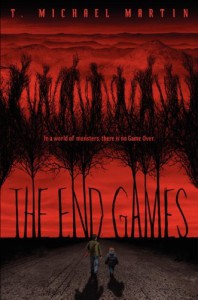 Die deutsche Rezension findet ihr hier.
Die deutsche Rezension findet ihr hier.3.5
___________________________
Michael has only one aim: to finish the game, so his brother Patrick and he can get to the Safe Zone and go looking for their mother. It’s still a long way to the zone, though, and for now the zombies are happy enough to try to eat their brains. So far, the two boys fared well because they stuck to the rules, but not everybody does – Michael didn’t tell his brother the whole truth, and there are not only for Patrick some surprises waiting.
“The End Games” has not been what I expected it to be. Both title and description indicated an actual (and perverted) game, which was the aspect I was most looking forward to – next to the boys’ relationship. Sure, it sounds strange that someone would start a children’s version of SAW after the apocalypse, but why not? It just needs a good explanation.
Soon I had to discover that things are a little bit different here. It’s not difficult to guess, though the game is still of importance throughout the novel – it simply plays a different role.
When it comes to the brothers, again I didn’t exactly get what I wanted. Michael and Patrick may be at the centre of attention, but we soon get distracted. First (later as well), we learn about their past which can explain much that is going on now; and yes, I really started to like Michael and Patrick (though the latter could get a little bit annoying sometimes). The time with those two wasn’t as intense as hoped, though, and that’s because other characters pop up – dammit.
I’m not exactly unsatisfied with how the novel continued, and I loved the ending. However, in between some of the things going on are partly predictable and partly clichéd. That only applies to the characters, mind you, even though they themselves are not characterized in a clichéd way. It also applies to the romance which I couldn’t care less about. It was rather unnecessary, a friendship would have been perfectly sufficient. But of course you have to fall in love with the only girl ...
Anyway, mostly everything is fine with the plot. There is, of course, the issue with the game, but besides that the book is thrilling, especially the end, partly because of the twists and surprises the author came up with. What seemed easy to begin with turns out to be a little bit more complicated, though the origin of the zombies is never fully explained. Some points “just are”. It doesn’t matter, actually.
On the other hand, it’s so thrilling because it’s told that way. The writing style is how Michael would tell us the story. In theory, that’s how it’s always supposed to be, but in practice it can be more or less accomplished. In this case, it’s more accomplished. The text is casual and is often “interrupted” by Michael’s thoughts in italics. Those parts can be a little bit difficult to read (he really thinks a lot), but that’s not too often the case.
In the end, you do get the story of two brothers – especially the story about a brother fighting for the other one to be able to have a life. His methods might not be to everybody’s tastes and sometimes I wasn’t too happy with what he did, but that only makes him more realistic. If you try to do something great, you might fail horribly – but if that happens here, is yours to read.
“The End Games” is different than expected and I don’t say that in an overly positive way. Still, you get a thrilling story of a brother who had to take responsibility way too early – this book is no waste of time, though it might not be the best to read about the topic either.
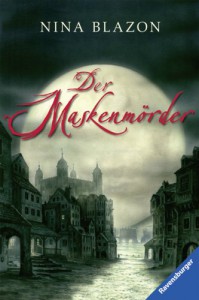 England im 18. Jahrhundert: Lucius Gildare ist alles andere als ein Opernfan, aber die Vorstellung, zu der seine Tante ihn an diesem Abend gezwungen hat, wird sein Leben komplett verändern: Der größte Konkurrent des neuerdings in London auftretenden Giacomo Amorelli wird mitten auf der Bühne ermordet – und Amorelli ist der Hauptverdächtige. Lucius wittert seine Chance etwas zu tun, das er mehr mag als die Arbeit im Kontor seiner Tante: ermitteln. Zusammen mit Célestine Androis macht er sich auf die Suche nach dem wahren Täter – auch wenn Signore Amorelli noch lange nicht aus dem Schneider ist.
England im 18. Jahrhundert: Lucius Gildare ist alles andere als ein Opernfan, aber die Vorstellung, zu der seine Tante ihn an diesem Abend gezwungen hat, wird sein Leben komplett verändern: Der größte Konkurrent des neuerdings in London auftretenden Giacomo Amorelli wird mitten auf der Bühne ermordet – und Amorelli ist der Hauptverdächtige. Lucius wittert seine Chance etwas zu tun, das er mehr mag als die Arbeit im Kontor seiner Tante: ermitteln. Zusammen mit Célestine Androis macht er sich auf die Suche nach dem wahren Täter – auch wenn Signore Amorelli noch lange nicht aus dem Schneider ist.Um „Der Maskenmörder“ zu umschreiben, reicht eigentlich das Wort „nett“, und viel mehr gibt es dazu auch nicht zu sagen. Vom Schreibstil, über die Charaktere bis hin zum Plot – alles ist angenehm zu lesen und durchaus interessant, nie aber herausragend oder spannend. Nina Blazon auf Sparflamme sozusagen.
Die bisherigen Bücher, die ich von der Autorin gelesen habe, es sind zugegebenermaßen nur zwei, haben mich beide nahezu durchweg überzeugt, weswegen irgendwann auch „Der Maskenmörder“ in meinen Warenkorb wanderte, aber ein weiteres Wunderwerk darf man hier wirklich nicht erwarten. Zwar wusste ich nicht sofort, wer der Mörder sein soll, aber früher oder später muss man einfach draufkommen, weil sich der Täter recht auffällig verhält. (Nicht dass Lucius das merken würde …) Das Motiv muss freilich noch ermittelt werden, aber der Weg dorthin war eben nicht sonderlich spannend.
Abgesehen davon mag das Ende einige Leser womöglich erfreuen, mich hat es aber ein wenig genervt, zumal es sehr vorhersehbar war, allerdings gilt das ja auch für andere Aspekte des Buches. So bleibt’s Geschmackssache, ob man damit etwas anfangen kann – ich hatte da so meine Probleme.
Trotzdem wünsche ich mir, dass es sich hier um eine Buchreihe handelte. Die Charaktere erhalten in der Kürze des Buches nicht unbedingt Tiefe, aber irgendwas müssen sie haben. Gerade Lucien mit seinem Wunsch, dem Gesetz gerecht zu werden, hat mich mit der Zeit ein bisschen begeistert. Ich würde mich wahnsinnig freuen, wenn man ihn in mehreren Bänden noch näher kennenlernen könnte – aber nicht nur ihn. Auch seine Tante Isobel zeigt Potential, genauso der Constable Avory, Célestine und einer ihrer Freunde namens Yves … man mag sie hier vielleicht nicht gut kennenlernen, aber es ist offensichtlich, dass da noch mehr ist. „Leider“ ist die Geschichte aber in sich abgeschlossen; Hoffnungen auf ein Wiedersehen muss ich also vermutlich begraben.
„Der Maskenmörder“ ist so ein Buch, das man zwischendurch mal lesen kann, wenn man von Nina Blazon nicht genug kriegen kann. Aber Achtung: Zu viel darf man nicht erwarten! Besonders die Charaktere mögen Potential haben, da es sich hier aber um einen Einzelband handelt, bleibt dieses nahezu ungenutzt.
 Die deutsche Rezension findet ihr hier.
Die deutsche Rezension findet ihr hier.___________________________
People in Blackwell are different, because they are descendants of Germanic gods. Not everybody knows about it, but Matt Thorsen is aware of the fact that one of his ancestors is Thor. Fen Brekke knows it as well, only that in his case he’s one of the sons of Loki – and how couldn’t he when he can change into a wolf? It’s those two and Fen’s cousin Laurie who try to find other chosen descendants of the gods. Ragnarök is coming and it’s Matt’s task to kill the Midgard Serpent to prevent the end of the world. He can’t come that far alone, though, especially since some seem to be looking forward to the cleansing of the world ...
The main characters are all about 13 years old, so I don’t exactly belong to the target group – but how could I say no to Germanic mythology and Kelley Armstrong? I didn’t regret my decision, though the book is far from perfect.
There’s not much I could say against the main characters, despite their flaws. Matt’s a nice guy (and he has red hair – yes, that IS an argument), but at some point him constantly babbling about how he had to “protect the girl”, even though said girls already showed they can take care of themselves, was getting on my nerves. Fortunately, there is something called character development – though that didn’t go too smoothly all the time – so even mini-Thor realizes that 1) girls are capable (plus, boxing gets you only so far), 2) it’s okay to be afraid when you’re 13, and 3) nobody expects him to be the perfect leader all the time. Same could be said about Fen Brekke, who usually mistrusts everybody except Laurie and would rather get into trouble than look for help, and for Laurie Brekke, a sensible and clever girl who lets Fen get away with too many things. It was fun to accompany them on their journey (and to see Matt and Fen banter), though sometimes characteristic changes came too abrupt. However, they never seemed to be illogical.
It’s a little bit different with the characters appearing later. I instantly liked Owen and Baldwin, but you barely get to know them, which can be said about others as well. It’s not surprising: some of them rarely appear, others appear more or less in a group, so there isn’t much time left to get to know more about them before the novel ends.
When it comes to the plot ... well, I get why not everybody is happy with it. Something is happening, it just isn’t that much. We learn of Ragnarök and everything that follows is the protagonists’ – usually aimless – attempt to find other descendants of the gods, so the world will not end. If the current pace is continued (and the following book titles suggest that much), then we can expect the big battle at the end of the third book. “Loki’s Wolves” is a mere prelude. I’m also not sure what to think of the ending; the authors might make up for that in the next book, but for now it didn’t only come abruptly, but also seemed rather baseless, sort of. Maybe that’s because it was actually hinted at so obviously that I thought it wouldn’t happen because that would be way too ... well, obvious. As a result, I wasn’t surprised but looked more like this:

Fortunately, I have been trapped in a tram while reading this, so I couldn’t do a desk flip.
Besides that, the book contains some inconsistencies, partly only relating to the text-picture-correspondence. Every now and then there are images depicting a scene of the book – at least supposedly so, sometimes they don’t really fit. For example: the text tells us that Laurie is hugging Fen when Matt enters, in the picture they’re still talking to each other. Or: a policeman is described as young, but depicted as middle-aged. Mere details, I give you that, but still. It’s very confusing when Matt loses something but still owns it in the next picture, followed by the text stating that the kids simply bought a new one earlier. Never mind the unlikely behaviour of some minor characters or the illogical assumptions of more important ones. It doesn’t happen often, but it’s still enough to make the book look arbitrary in some instances.
That leaves the mythology and I really liked this aspect – I wouldn’t have minded even more of it. As an inhabitant of Blackwell and descendant of Thor, Matt knows much about the stories and whenever he can/has to, he shares them. For us that means: trolls and other mythical beings (I instantly fell in love with the Valkyries), some stories, usually less funny ones, about the gods, though some of that is nothing new, even if you don’t know that much about Germanic mythology (I don’t).
All in all, “Loki’s Wolves” is okay. The time the characters spend together tends to be funny and the mythological part definitely is interesting and entertaining. On the other hand, there some things that don’t make much sense, as well as the plot without much tension and characters we barely get to know. Still, I could enjoy the book, just not as much as I hoped I would. I’m probably going to continue reading the series, but I’m relieved I chose the paperback edition – I wouldn’t want to buy a hardcover in this case, to be honest.
 Die deutsche Rezension findet ihr hier.
Die deutsche Rezension findet ihr hier.___________________________
Yukiko is the daughter of Masaru, official Hunter of the Shōgun, the ruler of the eight isles of Shima. The life of the land and the people is more and more taken by the blood lotus, a plant on which all of Shima’s wealth and power is based on, but the Shōgun does not care about such matters. He orders Yukiko’s father to find him a griffin (or: arashitora) – even though those are long believed extinct and only alive in myths. It seems a hopeless undertaking as both defying as well as failing the Shōgun means certain death – he doesn’t accept it that not all of his wishes can be fulfilled. Yukiko does not know yet that this seemingly senseless journey will set things in motion that can change the whole country.
At first sight, “Stormdancer” seems to be plain awesome. It looks differently if you have a closer look. I have nothing against authors approaching a foreign culture in general. That can offer a new point of view, which is nothing bad in itself. Nonetheless, there are some rules you should stick to and I’m not sure Jay Kristoff did that.
I already had some problems with Leigh Bardugo’s “Shadow and Bone” because the author neglected very simple facts, for example female surnames ending with an A. I’m no expert in Japanese mythology and all I know about the country comes from mangas, animes and certain lifestyle magazines (though Wikipedia as the author’s source really isn’t much better). So I can’t tell whether he only mixed Japanese myths or other Asian ones as well – but I think we can trust other reviews on that matter, especially since even I stumbled upon some things that didn’t seem quite right to me.
It comes all back to the language in the end and the author’s dealing with it is … well, not exactly satisfying. Again, I’m no expert and I know nothing about Old Japanese, but some things simply attract attention. First and foremost, there’s the usage of “hai” as “yes” in any possible context; much like the German usage of this word, to be honest. Unfortunately, this little word cannot be used as varied as that, which is why I can’t understand why he uses it at the end of a sentence to mark it as a question – he might have added “ne” for that. (I think.) Of course, this is fantasy, but if you take that direction with your argumentation you might as well excuse any poor research with it.
What really irked me was the usage of “-chan”. Suffixes seem to be a problem in general, as he uses them as independent forms of address. Not so with “chan”, but it usually applies to people we hold dear and is often used for girls – sometimes even adult women, but then it is often degrading. If you add “chan” to someone’s name who is neither a child nor someone close to you, then you consider yourself above them – at least that is what I understood. I guess I don’t have to explain to you why I didn’t like women constantly being addressed like that (even if they were talking to each other), despite not knowing each other and neither of them being above the other. Women might not be acknowledged much in the world Kristoff created, so sometimes it makes sense. But characters of both sexes who obviously disagree with such a sexist notion still calling women “chan” – that doesn’t.
I’m not done with the language yet, as Kristoff’s style needs to be discussed as well. It’s sad if a book lacks any description, but describing everything too detailed is not good either. I don’t need to know where every speck of dust is placed; my imagination is fully working as well, dear author, and I like to make the presented world a little bit more like my world. The descriptions here seem wasted. While we get to know everything about the Shōgun’s clothing, Japanese terms are usually explained once if at all. Sometimes that’s enough; most people probably know about “obi”, “kimono” and “katana” and something like “arashitora” is catchy enough. But what about “wakizashi” or “ō-yoroi“? Words like these cause trouble and if you constantly have to look up words in the glossary, there isn’t much fun in reading left. By the way: the glossary is sorted after topics first, then alphabetically. Totally makes sense when dealing with completely unknown words.
Things get better as the story progresses, though only because I decided I wouldn’t be bothered any longer, meaning I did not look up any unknown word and tried to understand it within context instead. I can’t know whether I understood everything correctly, but the images in my head definitely weren’t less detailed.
Besides all of that, the author interprets his own text like an English one, so refers to “impure” as having two syllables. Seeing that the people actually speak Japanese, this is problematic – the English “impure” might have two syllables, but the Japanese word for it as well? And why do you need to explain Japanese terms to Japanese speaking people? It really doesn’t make much sense.
Otherwise, the book actually isn’t that bad and if you don’t care about those linguistic aspects, you might have a lot of fun. The main protagonist, Yukiko, is someone who knows how to get their will and that rather impressively. She and many of the other characters are good but flawed people whom I sometimes liked and sometimes didn’t. And there’s the arashitora, of course. I liked him from the very first moment on, despite or maybe because of his nearly cruel brutality, and I liked him even more as we got to know him, saw him change. The relationship between him and Yukiko develops nearly too easily, but it was fun to read about them getting to know each other and being together.
The fight scenes are something to look forward to as well; they aren’t unnecessarily long and Jay Kristoff isn’t squeamish when it comes to hurting characters. Well, if you include chainsawkatanas, this has to have some consequences – especially during conflicts and those simply had to arise. Most people might not want to see what has been done to the country, yet, but they can’t look away forever. Some aren’t any longer. “Stormdancer” has something to offer after all and still could have been a good book – could have.
There isn’t much tension to begin with. The first chapter (and the blurb) already tells you that Yukiko is going to meet the arashitora, so even though I was interested in her past and wanted to know why her relationships were the way they were, this didn’t make the first hundred pages thrilling. It gets better as the story is nearing its end, but that changes all too quickly again when Kristoff overdoes it with the drama. It’s partly the pointless love story’s fault and I’m still brooding over its right to exist – I can’t find it. Most of the time Yukiko thinks of his green eyes and the feelings that later supposedly develop (on his side) are far from believable. Some of the positive points vanish as quickly as they came – it really is a pity.
What looked like a thrilling adventure, turned out to be a story admittedly full of action, which is also overdramatized, though, ignores the simplest linguistic basics and only shines every now and then. For some this might be the right book to pick up, but this decision should be well considered.





